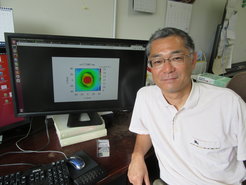Professor Masaru Shibata appointed as new director at the Max Planck Institute for Gravitational Physics in Potsdam
The computational astrophysicist will strengthen and broaden the institute’s competence in numerical relativity, astrophysics and fundamental gravity. He will establish the Computational Relativistic Astrophysics division.
The detection of gravitational waves from merging binary black holes and neutron stars has marked a breakthrough in astronomy and astrophysics, and has opened an entire new window onto our Universe. Masaru Shibata, from the Yukawa Institute for Theoretical Physics at Kyoto University, is a world-renowned expert in numerical-relativity simulations of astrophysical events that generate gravitational waves. His research covers mergers of binary neutron stars and so-called “mixed binaries” – binary systems of a black hole and a neutron star – as well as stellar core collapse that form black holes. He has investigated the post-merger phase, elucidating the physical conditions to produce electromagnetic signals of the kind recently detected in association with the first binary neutron-star observed by Advanced LIGO and Virgo. Shibata is also interested in studying more fundamental aspects of General Relativity using numerical tools.

In the near future, a large number of gravitational-wave sources will be observed by the Advanced LIGO and Virgo detectors. The Max Planck Institute for Gravitational Physics (Albert Einstein Institute; AEI) in Potsdam plays a leading role in the development of waveform models and in the extraction of astrophysical and fundamental physics information upon detection, such as their masses, spins, neutron-star’s equation-of-state, Universe’s expansion rate, and distances from Earth. Shibata’s research focus is a perfect supplement to the already existing competence at the AEI. “I am thrilled that Masaru Shibata will join our institute and I am looking forward to fruitful interactions and collaborations,” says Professor Alessandra Buonanno, director of the Astrophysical and Cosmological Relativity division. “Neutron stars are among the most extreme sources of gravitational waves and we expect to learn much more about their exotic internal structure in the future. Shibata’s arrival is timely and his expertise fits perfectly into our vision of a modern institute capable of taking advantage of new discoveries in the field of gravity.” Her colleague Professor Hermann Nicolai agrees and adds: “Shibata is a true world leader in his field and I look forward to having him as a colleague and co-director at the institute.”
Masaru Shibata focuses on theoretical general relativistic astrophysics. He has been working on numerical solutions of Einstein’s theory of general relativity. For highly complex processes such as merging neutron stars and/or black holes these non-linear differential equations cannot be solved analytically. Therefore, numerical relativity simulations using high-performance computers are the suitable approach for theoretical studies. Numerical relativity simulations play an important role in predicting accurate gravitational waveforms for the search in the detector data and for exploring high-energy phenomena such as supernova explosions and gamma-ray bursts.
Masaru Shibata earned his PhD in physics at Kyoto University in Japan. While at Osaka University as an assistant professor (1993 – 2000) he became visiting professor at the University of Illinois at Urbana-Champaign, USA. In 2000 he has been appointed associate professor at the University of Tokyo. He joined the Yukawa Institute for Theoretical Physics at Kyoto University as a full professor in 2009. Shibata is a Fellow of the International Society on General Relativity and Gravitation. He was awarded the Nishinomiya-Yukawa Memorial Prize in 2003 and an Outstanding Paper Award of the Physical Society of Japan in 2008. In 2010, Shibata received one of the Excellent Young Researchers Prizes of the Japan Society for the Promotion of Science.












